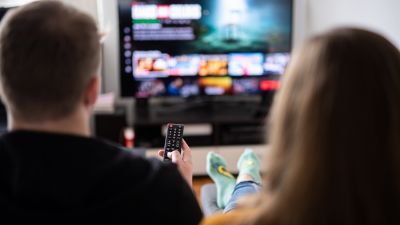Portsmouth researchers say watching television along with a young child can be good for them

Watching television along with a young child can be beneficial to their cognitive development, according to a new study.
Researchers from the University of Portsmouth say that although too much exposure of young infants to TV may be detrimental to play, language development and executive functioning, watching age-appropriate content can also have its benefits.
These benefits can include reinforcing their learning and improving conversation skills through co-viewing with an adult.
Dr Eszter Somogyi from the university's department of psychology said: "We're used to hearing that screen exposure is bad for a child and can do serious damage to their development if it's not limited to, say, less than an hour a day. While it can be harmful, our study suggests the focus should be on the quality or context of what a child is watching, not the quantity.
"Weak narrative, fast-pace editing, and complex stimuli can make it difficult for a child to extract or generalise information.
"But when screen content is appropriate for a child's age, it's likely to have a positive effect, particularly when it's designed to encourage interaction."
Dr Somogyi explained: "Families differ a lot in their attitudes toward and the use of media.
"These differences in the viewing context play an important role in determining the strength and nature of TV's impact on children's cognitive development.
"Watching television with your child and elaborating and commenting on what is viewed can help enhance their understanding of the content, reinforcing their learning during educational programmes.
"Co-viewing can also contribute to the development of their conversation skills and provides children with a role model for appropriate television viewing behaviour."
The authors recommend reinforcing contexts that promote learning, such as viewing chosen age-adapted content, viewing with adult supervision, and not having a second device or TV screen on in the background.
The research authors point out that in the past 30 years the number of television programmes targeting infants had increased with the screen time of children aged between 0 and two years doubling between 1997 and 2014.